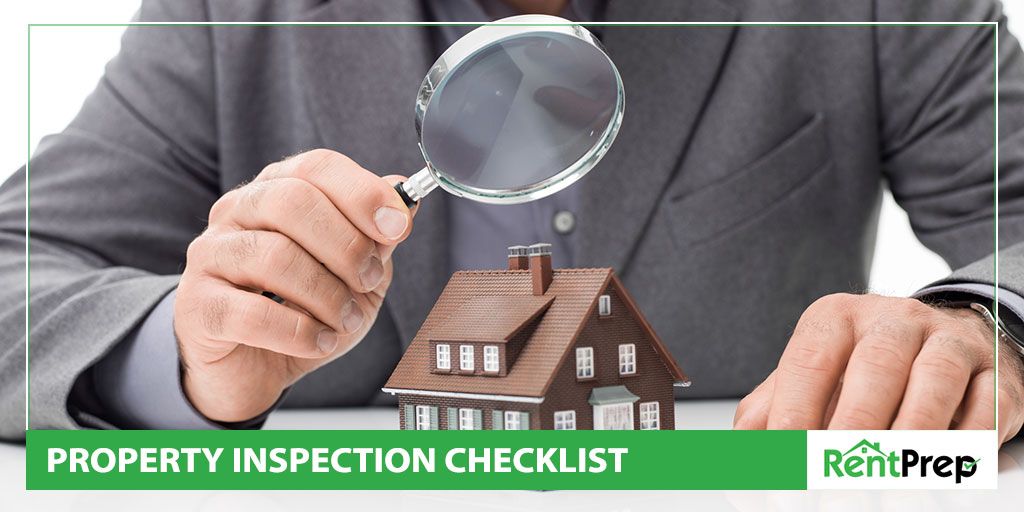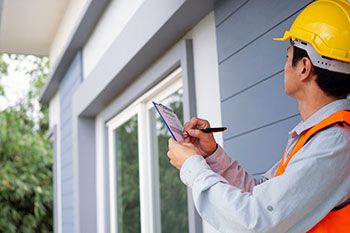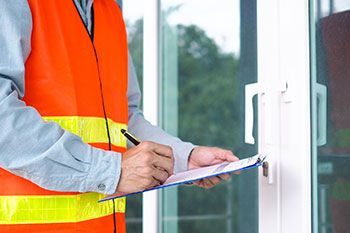
Before buying a new investment property, it is essential that you work through your rental property inspection checklist and ensure that you are making a wise choice. Inspections done by you and by professional home inspectors will help you better evaluate potential repair and renovation expenses and rentability.
If you choose to skip an official inspection and don’t have a good buyer’s home inspection checklist to complete yourself, you could end up getting stuck with a money pit. Issues that should have been detected, like a lousy HVAC system or a leaky roof, will become your problems. And those problems will probably be costly.
So, what then should landlords include in their home inspection when investing in new rental properties? Learn more about the ultimate rental property inspection checklist today in our complete guide.
A Table Of Contents For Home Evaluation Checklists
Evaluating homes before buying is often thought of from a personal perspective, but landlords also need to be prepared with a complete buyer’s home inspection checklist. This checklist should be geared toward landlord-specific needs. Follow along with our guide now:
- What Is A Property Inspection Checklist For Buyers?
- Why Should Landlords Use A Property Inspection Checklist?
- The Ultimate Rental Property Inspection Checklist
- Residential Inspection Checklist: Landlord FAQs
- What is the difference between a house inspection and a rental property inspection?
- What is most often missed on a property inspection checklist for buyers?
- Do I have to have a home inspection before buying an investment property?
- Does every problem that shows up on a property inspection need to be remedied immediately?
- Ready For Your House Inspection Checklist?
What Is A Property Inspection Checklist For Buyers?

When buyers make an offer to purchase a property, that offer typically includes an official inspection by a home inspector. Before reaching that stage, however, buyers can be more prepared by having their own property inspection checklist.
A property inspection checklist for buyers is a list they can use while viewing a property to notice and evaluate potential problem areas. Many potential problems will appear on the official inspection, but buyers can make more informed offers by having their own checklist as well.
These inspection checklists are for personal use and evaluation of the property, and the priorities on any given checklist can and will vary.
Why Should Landlords Use A Property Inspection Checklist?
Landlords looking to expand their real estate investment constantly seek ways to choose the best possible rental properties. One method used by experienced landlords is the property inspection checklist.
Like any home buyer looking for their forever home, landlords and real estate investors have specific needs. If a given property on the market cannot meet these needs, it’s best to keep looking.
Using a property inspection checklist ensures that you discover as many problems as possible while evaluating potential investment properties. Even though more issues may come up during an official home inspection, having preliminary knowledge about what to expect from that inspection and what to offer on a property is vital to your long-term profitability.
Without a tool to guide you through property viewings, you might find it hard to keep track of everything. Having a great checklist in hand ensures that you are focusing on the right details and keeping track of what is and what is not working. This will be vital information when you try to determine the right investment property for your business.
Shouldn’t I Leave It To A Professional?
In most cases, we recommend that landlords still get a professional home inspection done on properties they are interested in purchasing. However, that type of inspection doesn’t happen until after you have submitted an offer and are, in many ways, committed in both time and money.
The point of a property inspection checklist for landlords who are buying is to evaluate a property before they get to the offer stage. You want to learn more about the property to decide if it’s a good fit before making any type of offer, and a complete rental checklist allows you to do just that.
The Ultimate Rental Property Inspection Checklist
Now that you’ve learned more about why landlords should have a great inspection checklist, let’s discuss what should be on that checklist. We recommend having either a physical copy of this form to complete or a fillable digital copy when viewing any potential properties. The finished list will help you focus your viewing and collect critical intel.
We suggest including the following information on your inspection checklist. Remember, however, that you can and should adjust this checklist to match your business’s specific wants and needs.
- Exterior:
- Siding or exterior finish (type, condition, color)
- Gutters and downspouts (type, condition)
- Roof (type, condition, age)
- Chimney (condition, age)
- Foundation (visible cracks, ground around foundation edges)
- Doors and windows (moisture, usability, security)
- Other structural issues (bowing, sagging, etc.)
- Other exterior issues (leaning trees, termite rot, standing water, etc.)
- Interior
- Any mold or mildew
- Attic and basement
- Water or moisture
- Insulation type and condition
- Ventilation
- Safety of visible electrical components
- HVAC system
- Type
- Service records
- Age
- Condition
- Airflow
- Air filter condition
- Plumbing
- Water pressure in all rooms
- Fixture condition
- Leaks
- Water heater condition and age
- Proper drainage in all sinks and bathrooms
- Electrical
- Grounding
- Switch functionality (all should be operable and safe)
- Type of electrical panel
- Wiring age and type
- Appliances
- Age and condition of all major appliances
- Exhaust fans, grounding, and correct electrical plug types as needed
- Rental Property Considerations
- Will upgrades need to be made to attract tenants?
- Is the layout good for renting, especially when dealing with multi-unit buildings?
- Are there any special rental laws in the area?
- Are there currently tenants living at the property?
- Are the present appliances included in the sale?
How To Use The Checklist

Now that you have our ultimate landlord property inspection checklist, you might be wondering how to use it.
Essentially, the checklist is a complete list of every area of the home that you should pay special attention to. Rather than focusing on the cosmetics, the list focuses on the structure and integral parts of the house.
Under each section header, you will find a list of things to look out for. For example, take a look at the plumbing section again:
- Plumbing
- Water pressure in all rooms
- Fixture condition
- Leaks
- Water heater condition and age
- Proper drainage in all sinks and bathrooms
While viewing a potential rental property, you will want to check the water pressure to ensure it is coming out of faucets appropriately. Next, you’ll want to look for signs of leakage and examine the condition of fixtures to be aware of potential repairs and improvements that will be needed. Finally, you’ll want to be sure everything is draining properly and that the water heater is in good condition.
In each section, work through the checklist as you move through the property to ensure that you are aware of as many trouble spots as possible. The checklist is designed to be streamlined so you’ll have all the most important information, but don’t let the shortness of the list fool you: there’s a lot to look at as you examine each potential investment property.
Staying Up-To-Date
Working in the rental industry, there are constant changes that you need to know about in real estate, housing development, rental laws, and more. It can be a lot for even the most experienced landlords to keep track of. It’s hard to stay up-to-date in a business that is constantly changing.
By signing up for RentPrep’s newsletter, you will be alerted whenever we update our blog with new informational guides that can help you stay informed. Additionally, you’ll be able to gain access to all of our free forms that can be used as templates for your rental business.
Don’t fall behind; allow us to update you through our newsletter and blog posts. We’re dedicated to helping landlords like you succeed. Sign up here today.
Residential Inspection Checklist: Landlord FAQs
What is the difference between a house inspection and a rental property inspection?
It can be confusing to know what type of inspection someone is talking about when dealing with rental properties. A home inspection may refer to checking up on a property that is being rented out, or it might be for inspecting a house that a landlord is considering buying. The only way to be sure which type of inspection is being referenced is to ask for clarification.
There are also some differences between the two types of inspections. Rental property inspections are intended to check up on a property to ensure that tenants are following the lease agreement and that the property is still in safe, habitable condition. The inspection checklist in that situation focuses on addressing these concerns.
On the other hand, a house inspection for landlords buying new investment properties focuses on the bones and big-ticket parts of the house. The inspection checklist will hone in on what will need to be upgraded, replaced, and otherwise changed to make the property a profitable rental. Some items may show up on both checklists, but the goals of the inspection checklists are different.
Check out this video on what to look for during a rental inspection:
What is most often missed on a property inspection checklist for buyers?
Landlords looking at properties for sale often have a checklist of items, but this doesn’t mean they’re going to catch everything. There are a few issues that are commonly missed when inspecting a property.
Some of the biggest things that landlords who are shopping around might not notice are hidden problems such as foundation cracks disguised behind paneling or electrical components that have not been upgraded but have been covered up instead.
Thankfully, these things will usually come back on a home inspection by an official inspector. That is a big part of why you should avoid waiving an inspection even if you opt for a streamlined investment inspection. The big five (roof, foundation, electrical, plumbing, and HVAC) should always be checked.
Do I have to have a home inspection before buying an investment property?
In some states, you may be required to have a home inspection when completing a real estate transaction. Most regions, however, allow this to be waived if all parties agree. Most investors and landlords prefer to have at least some type of inspection completed.
The results of a home inspection can tell you what type of expenses to expect and ensure that you are making a good investment. Additionally, inspections included as part of buying clauses allow for negotiating power and the ability to leave a deal that turns sour. Don’t get stuck with a property that will be a money pit just because you want to skip an inspection.
Does every problem that shows up on a property inspection need to be remedied immediately?
Work and repairs do not necessarily have to be done just because an issue shows up on a property inspection. Some issues, like a failing roof structure, must be addressed before a rental property is deemed safe and habitable. Other issues, such as cosmetic issues, are not required to be addressed.
However, making these changes before marketing the investment property may make it more appealing to potential renters. For that reason, many landlords use their inspection results as a kind of to-do list when preparing a new property.
Ready For Your House Inspection Checklist?
In most situations, there is no good reason to buy a property without first viewing it and completing your house inspection checklist. By having a thorough property inspection checklist that you utilize before every investment, you’ll be able to make sound decisions that will benefit your business.
Don’t forget to check all of the following when evaluating potential properties:
- Are there any known sewage, electrical, plumbing, or HVAC issues?
- How recently were the HVAC system and roof repaired or replaced?
- Do the local rental laws and regulations fit your business?
- Are any of the seller’s disclosures concerning to you?
- If already occupied, are the current renters reliable and up-to-date with rent?
By asking these questions while completing your house inspection checklist, you’ll create the most comprehensive rental property view. This is key to making wise investment choices. You’ll keep your business on the right track with all this information.

